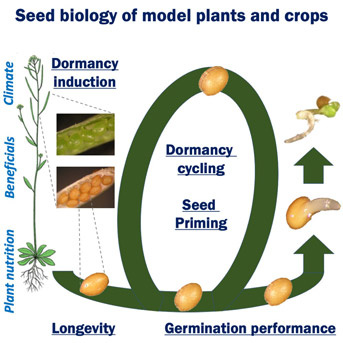Germination: A biological process to improve the nutritional properties of seeds?
Germination is a complex process. It is initiated by water uptake by the dry mature seed and ends with the rupture of the seed coat and the emergence of the embryo. All the stages prior to embryo emergence can be considered as pre-germination phases. Conversely, growth, elongation and cell division of the emerged embryo are post- germinative phases that contribute to the formation of the young seedling. The consumption of young shoots (spinach, mustard, soy, radish, etc.) is often associated with nutritional properties such as the supply of dietary fibres, vitamin C or carotenes. Nonetheless, nutrient content per unit of biomass is much higher in pre-germination phases and decreases sharply during the mobilization of reserves and seedling growth. Pre-germination significantly reduces anti-nutritional compounds while increasing the digestibility of proteins, the pool of free amino acids, and the release of minerals and certain vitamins. Pre-germinated seeds represent an excellent compromise having the nutritional advantages of young shoots, while retaining the reserves and organoleptic qualities of the dry seed. The PHYGERM team is developing germination technologies for the improvement of seed nutritional quality based on metabolic markers.
"Smart Priming Technology"
"Priming" is a seed treatment process that comprises controlled pre-germination and re-drying before embryo emergence. Subsequent germination of treated seeds is more rapid and homogeneous with the synchronised emergence of young seedlings. In addition, seed coating technologies can incorporate fertilizers and phytosanitary products (fungicides, insecticides) in order to protect seeds and young shoots from biotic and abiotic stress. Primed seeds cannot, however, be stored for long periods before sowing and the flux of commercial stocks requires careful management to prevent excess batches being carried over from one year to the next.
The PHYGERM team is developing an innovative seed treatment, termed "Smart Priming Technology", based on knowledge of the fine and complex regulation of the physiological and biochemical processes associated with germination. Using a synergistic and additive combination of plant-derived molecules, a single "priming" treatment achieves 3 objectives:
- Improved germination vigour (speed and homogeneity) by eliminating seed dormancy.
- Increased tolerance to abiotic stress and pathogen pressure during seedling emergence.
- Partial reestablishment of treated seed storage capacity that allows batch carryover to the next year year.
- Improved germination vigour (speed and homogeneity) by eliminating seed dormancy.
- Increased tolerance to abiotic stress and pathogen pressure during seedling emergence.
- Partial reestablishment of treated seed storage capacity that allows batch carryover to the next year year.
"Smart Priming Technology" is a process directly targeted to the stimulation of the embryo’s cellular and molecular systems that uses bio-based molecules and leaves no residues or dust in the environment. This approach is adjustable and adaptable and the technology is compatible with the regulations governing organic farming and can be tailored to agricultural or domestic seed uses. Plant producers and farmers using “smart primed” seeds will benefit from economic and environmental gains.
Declaration of invention and valuable results 2017 – INRA, DI-RV-17-0052 - Rajjou L, Pozza O, Chauffour F. Innovative seed treatment based on priming technology.
Brevet FR1915194. 2019 – Verly C, Giraud F, Rajjou L, Dellagi A, Saint-Macary ME. ELICITEST - Development of an immune-based evaluation method for plant priming and elicitation.

Leader:
Helen North